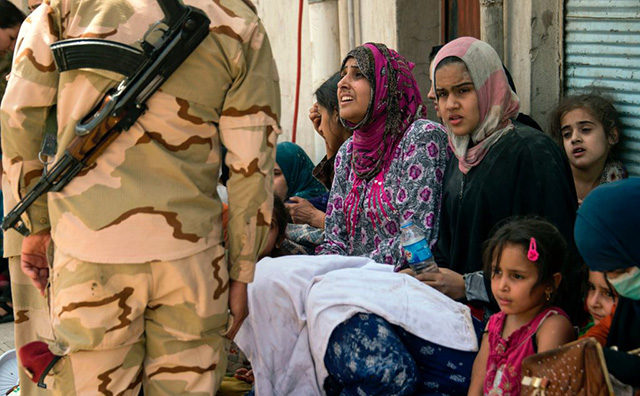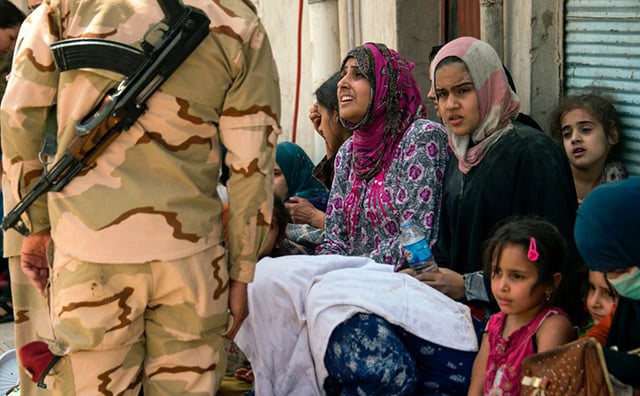
Support justice-driven, accurate and transparent news — make a quick donation to Truthout today!
 The movie Three Billboards Outside Ebbing, Missouri suppresses the specific stories of Arab and Muslim women harmed and displaced by US military interventions in the Middle East. Here, Iraqi women who fled fighting between government forces and the Islamic State wait in Mosul prior to being relocated on July 8, 2017. (Photo: Fadel Senna / AFP / Getty Images)
The movie Three Billboards Outside Ebbing, Missouri suppresses the specific stories of Arab and Muslim women harmed and displaced by US military interventions in the Middle East. Here, Iraqi women who fled fighting between government forces and the Islamic State wait in Mosul prior to being relocated on July 8, 2017. (Photo: Fadel Senna / AFP / Getty Images)
Martin McDonagh’s controversial award-winning film, Three Billboards Outside Ebbing, Missouri, suppresses the stories and voices of the female victims of US imperial military interventionist policies in the world — especially those in its war on terror in the Middle East. Hollywood demonstrates again and again its unwillingness to amplify these women’s voices, unless their words can be used to justify western imperial wars.
The film has been criticized for its sloppy gender and racial politics, but the film also fails to link these racial and gender politics with US imperial politics. The idea is not simply to broadcast these women’s words and to validate their identities back to them, but also to hold the US imperial military accountable for its crimes in the region and to rethink solidarity politics in more universal terms, in a way that goes deeper and beyond a liberal politics of identity.
No Billboards for Sexually Assaulted Arab Women
In the film, a returning US soldier, who had accosted the protagonist Mildred Hayes (played by Frances McDormand, a role for which she won best actress) in her store, confesses to a friend in a bar that he raped and murdered a woman in circumstances that sounded uncannily similar to the rape and murder of Hayes’s daughter, Angela, a few months earlier. Suspecting that he found Angela’s murderer, the violent and racist police officer Jason Dixon (played by Sam Rockwell, for which he won best supporting actor) picks a fight with him to procure a DNA sample, which eventually exonerates the ex-soldier.
When Dixon insists that he was confident about what he heard, the new African American chief of police, Abercrombie (Clarke Peters), assures him that whatever he confessed to happened in some mysterious “sandy country,” and that all other information about the case is confidential. Although at the end of the film, both the mother Hayes and the now-redeemed racist police officer plan on driving to Idaho to hunt down this rapist-murderer ex-soldier, the conclusion of the film leaves, in the most generous reading, this possibility open (the implication is that they will not be bothered with him anymore).
The anonymous victim’s story was most likely drawn from the horrible record of atrocities that the US military committed in Iraq after the 2003 invasion. One particular story that stood out for its brutality is the story of the 14-year-old Iraqi girl, Abeer Qassim al-Janabi, who was raped by five American soldiers in Mahmoudiyah, 20 miles south of Baghdad, on March 12, 2006. The soldiers killed her and burned her body to hide the evidence and proceeded later to kill all the members of her family.
While the film moves away from the typical orientalist representation of Muslim and Arab women as victims of their “backward” cultural traditions, it fails to give this victim of US imperial military politics a name or mourn her life. More importantly, it fails to hold her rapist-murderer and the regime he serves accountable for their crimes against humanity.
The Poverty of Intersectionality
The film’s ambiguous position on the rape and murder of the anonymous Arab woman is symptomatic of its sloppy intersectional politics, by which it tries to address gender and racial oppression in the US but fails to offer a substantive critique of the dominant structures of power. In the name of empowering women and militarizing them, therefore, the film grants the female protagonist a license to toy with racist taboos under the ruse of baiting the racist police.
On the one hand, the film seems to justify women’s rage and frustration at the failure of the US legal system to bring justice to its female victims. The film was praised for its critique of the current systemic misogyny of the US’s cultural, legal and political institutions. Its main symbol, the three billboards, which the protagonist Hayes rents, registers the inability or unwillingness of the law to solve the mystery of the rape and murder of the female victim. The billboards read: “Raped while dying,” “And still no arrests,” and “How come, Chief Willoughby?”
Hayes’s frustration and rage echo the agony and rage of many women in the US. The film empowered one woman to take action against the system at a time when many of them found themselves to be vulnerable against powerful men whose word has again and again been taken over the word of their accusers. Indeed, as some critics have noted, the film spoke to many women, because its release coincided with the revelations of the Weinstein scandal and many women found comfort and catharsis in it.
But the film’s celebration of the power of a single woman warrior should be put in a more nuanced perspective. First, Hayes is so clearly traumatized by the brutal rape and death of her daughter that her world starts to collapse and, as could understandably happen in such situations, she starts to hallucinate.
Second, the billboards were not meant to expose the impotence of the law per se, but to publicly shame the authorities and put pressure on the police of the fictional town of Ebbing to reassert its authority by bringing justice to the victim. Public shaming was, after all, originally an invention by the state in the 19th century as a mechanism of discipline and control. In this sense, the three billboards actually help the protagonist anchor herself in reality (she can see the billboards from her home) and eventually accept the authority of the law.
On the other hand, the film’s gender politics clashes with its understanding of post-racial politics in the US. Hayes thus violates some common racist taboos in US culture. After her African American employee was arrested for possession of drugs, Hayes walks into the police station to bait the racist cop Dixon, by calling him a “n***** torturer.” Invoking the authority of political correctness, the racist cop retorts that it is now called “person-of-color torturing.”
This is not an effective way to combat the US’s institutional racism. Perhaps she is permitted to toy with these taboos since she is presumably doing it on behalf of the Black victims of the US’s institutional racism, or since she considers her Black employee to be her friend. But at a time when Trump’s authoritarian, capitalist politics draws on racist enjoyment to support his populist, white supremacist nationalism, the film risks reproducing the same racist system it is trying to criticize.
Accountability and Solidarity for All Victims
The film only pays lip service to justice and solidarity because it ultimately fails to articulate the basis for identification and a common struggle with the anonymous Arab victim. The mother-cop duo’s plan to avenge the rapist-murderer soldier, regardless of who his victims were, disappears as soon as they hatch it.
What is needed here is linking the rape and murder of Arab and US women together as a byproduct of larger macrosystemic processes. These murders should have been situated in relation to US imperial politics within the context of the larger dynamics of the global capitalist system. Understanding the linkages between the two murders is also important for reconfiguring genuine international solidarity politics that can connect the struggles of all victims in a common struggle.
The film thus completely mystifies the socioeconomic struggles in this fictional part of red state “middle America” and never relates them to the increasing polarization of wealth in the US and around the world. As a result, the film’s failure to hold the perpetrator accountable for his crime is symbolic of its inability to offer a deeper political reading of these murders.
Inadvertently, however, the film’s main symbol, the billboards, has managed to inspire different social justice campaigns around the world, including those that followed the Grenfell Tower fire, the Parkland school massacre and more. It remains to be seen what mileage these campaigns can get out of an entertainment-based product. What is more important is to find out whether these campaigns can still be connected together by a common struggle.
Press freedom is under attack
As Trump cracks down on political speech, independent media is increasingly necessary.
Truthout produces reporting you won’t see in the mainstream: journalism from the frontlines of global conflict, interviews with grassroots movement leaders, high-quality legal analysis and more.
Our work is possible thanks to reader support. Help Truthout catalyze change and social justice — make a tax-deductible monthly or one-time donation today.